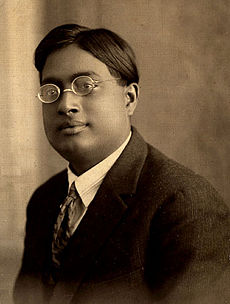WIKIPEDIA: Satyendra Nath Bose FRS[1] (Bengali: সত্যেন্দ্র নাথ বসু Shottendronath Boshū, IPA: [ʃot̪ːend̪ronat̪ʰ boʃu]; 1 January 1894 – 4 February 1974) was an Indian physicist specializing in mathematical physics. He was born in Kolkata, then spelt Calcutta. He is best known for his work on quantum mechanics in the early 1920s, providing the foundation for Bose–Einstein statistics and the theory of the Bose–Einstein condensate. A Fellow of the Royal Society, he was awarded India's second highest civilian award, the Padma Vibhushan in 1954 by the Government of India.
The class of particles that obey Bose-Einstein statistics, bosons, was named after him by Paul Dirac.
A self-taught scholar and a polyglot (mastery of multiple languages), he had a wide range of interests in varied fields including physics, mathematics, chemistry, biology, mineralogy, philosophy, arts, literature and music. He served on many research and development committees in independent India.
A "mistake" leading to Bose-Einstein Statistics:
The reason Bose's "mistake" produced accurate results was that since photons are indistinguishable from each other, one cannot treat any two photons having equal energy as being two distinct identifiable photons. By analogy, if in an alternate universe coins were to behave like photons and other bosons, the probability of producing two heads would indeed be one-third (tail-head = head-tail). Bose's "error" is now called Bose–Einstein statistics. This result derived by Bose laid the foundation of quantum statistics, as acknowledged by Einstein and Dirac.
Velocity-distribution data of a gas of rubidium atoms, confirming the discovery of a new phase of matter, the Bose–Einstein condensate... Einstein adopted the idea and extended it to atoms. This led to the prediction of the existence of phenomena which became known as Bose-Einstein condensate, a dense collection of bosons (which are particles with integer spin, named after Bose), which was demonstrated to exist by experiment in 1995.
Heroes should be recognized, and acknowledged.
Wikipedia: Satyendra Nath Bose
University of Colorado: Bose-Einstein Condensate Homepage (links below)
Chem4kids: Bose-Einstein Condensate

Comments